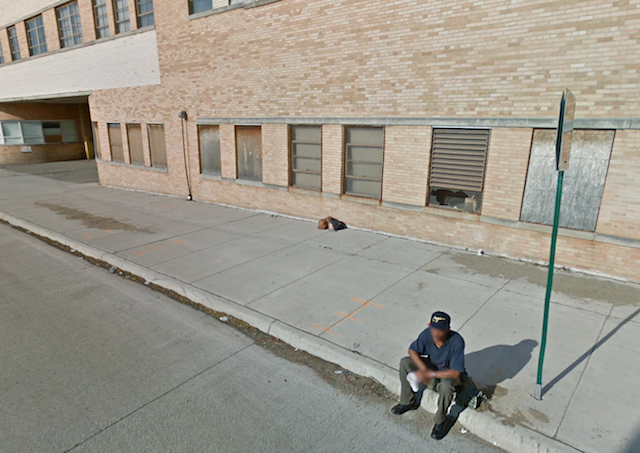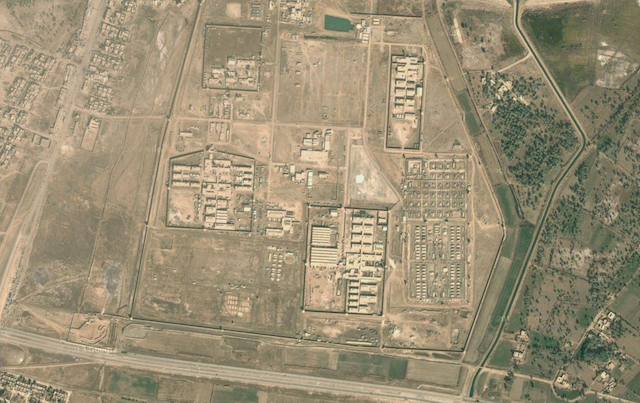Can’t get enough of the royal baby? Then this here’s for you. No more depressing headlines.
How do you name a future monarch? What do people in Australia, Paraguay and Djibouti have to say about the royal baby?
What kind of 24-karat gold-encrusted bib will his parents choose? Read all about the once-and-future bling and much more.
If you’re looking to read more about the royal baby, you’ve come to the wrong place. Maybe you wanted to read about aristocratic loinspawn or an otherwise picture-perfect couple marred by a bald spot that came several decades too early.
Instead, here are 10 actually noteworthy stories. None of them directly involve outdated financially burdensome traditions that support inbred families with long histories of colonial oppression. Here we go, in no particular order of importance:
10. Detroit has filed for bankruptcy
Its car companies were bailed out to the tune of $82 billion, but the city itself remained $18 billion in debt. The city was gutted by outsourcing and corruption. Most of the money and the people left and the city is in ruins. Now pensions and health care benefits owed to retirees are in danger. Unfortunately, this may not be rock-bottom yet. Read all about it via the Guardian.
9. 500 inmates broke out of Abu Ghraib
The last time anyone really paid attention to Abu Ghraib prison, it was sometime around 2004 when stories of inmates being tortured by American soldiers began to surface. In 2006, control of Abu Ghraib was given to Iraqi authorities. July 23, approximately 500 prison inmates broke out. There might have been inside help from guards and Al Qaeda has claimed responsibility. Senior Al Qaeda members were among the escapees. The Washington Post has more.
8. Obama gave a speech about Trayvon Martin
Recently, President Obama gave a 19-minute speech about Trayvon Martin. He described the historical context through which many African Americans viewed the case, talked about lessons and solutions, and related personally to the biased situations faced by male African American youth. He ended by addressing some of the problems politicians and the rest of us have when talking about race, saying that talks usually “end up being stilted and politicized, and folks are locked into the positions they already have.” Read a transcript of the speech here (source: CBS).
7. Apple website’s security flaws were exposed
Last Sunday, vulnerabilities in Apple’s developer website were exposed by a Turkish security researcher named Ibrahim Balic. He found flaws that allowed him to access the data of more than 100,000 app developers. He claims to have sent Apple 13 bug reports in total, one by one (source: news.com.au). After Apple didn’t respond, he collected some data to prove his point and see how bad the problem was. Basically, he found out something was wrong, then made sure Apple found out about it. To the detriment of people who point out these security flaws (and thus to their own detriment as well), Apple is calling this a security breach, according to the Guardian. No word yet on whether Balic’s in trouble.
6. Canonical raises funds for the Ubuntu Edge superphone
Canonical, the company responsible for the Ubuntu open-source operating system, wants you to help it fund the creation of a superphone called the Ubuntu Edge.
If you have a monitor lying around, you can use this phone as a fully-fledged PC running Ubuntu. As a phone, the Edge will be able to boot Android or Ubuntu. For the short-term, the phone will be available only to those who donate $600 or more. If the fundraiser does well, then Canonical may consider other commercial options. Pending specs: 4GB of RAM and 128GB of storage and an almost unscratchable sapphire screen. Why would you fund something like this? Because you want to be on the cutting … edge. Learn more from Indiegogo before your parting with your money.
5. Egypt is in chaos after a military coup
After the ousting of Hosni Mubarak during Egypt’s 2011 revolution, elections were held in 2012 and Mohamed Morsi became the country’s first democratically elected president. Earlier this July, the Egyptian Army ousted Morsi amidst accusations that he had failed to stabilize the country, while becoming increasingly authoritarian. Morsi, a prominent member of the Muslim Brotherhood, was given 48 hours to resolve problems he had with protesters and his secular opposition. The army-appointed Adly Mansour is acting president until elections are held again, if they are ever held again. Al Jazeera stated that, under Abdul Fatah al-Sisi, leader of Egypt’s armed forces and the man behind the ousting of Morsi and the installation of Mansour, the army has arrested journalists and shut down opposing media channels, according to The Huffington Post. Meanwhile, an article posted by Amnesty International,confrontations between the Army and supporters of Morsi have turned deadly.
4. The hyperloop might be the future of public transportation
It’ll take you from New York to Los Angeles in 45 minutes. What is it ? Space.com explains that it’s large vacuum tube with a magnetically levitated capsule, traveling without friction. By August 12, Elon Musk, the CEO of both Tesla Motors and SpaceX, will unveil a design for the Hyperloop. He was inspired to look into it after learning that California’s high-speed rail project would be both the most expensive, at $70 billion, and the slowest rail system on Earth. Musk claims that it will be twice as fast as an airplane and completely crashproof. Just imagine: no collisions, no traffic jams, no turbine-pureed birds.
3. Tesla Motors is doing well
Speaking of Tesla Motors and Elon Musk, electric cars are the future. First, Tesla’s Model S won the 2013 Motor Trend Car of the Year, according to Tesla Motors. Then Tesla repaid a $451.8 million government loan, reported TIME, which left critics and people who labeled it a government-sponsored loser in the dust. Dust, mind you, but not exhaust. Meanwhile, it has slowly been expanding its network of completely free solar charging stations. Last month it demonstrated a battery swap, stated TechCrunch, that was twice as fast as filling up at the pump. Slate Magazine mentions that despite many efforts to hinder it, including legislation backed by sore car dealerships, Tesla continues to succeed. Purchase, test drive, or ogle a Tesla vehicle at Tesla’s official website.
2. Meet the ATLAS robot
Among other things, Boston Dynamics builds robots. Funding comes from the Defense Advanced Research Projects Agency, or DARPA for short. Their latest endeavor is a humanoid robot called ATLAS (source: Boston Dynamics). It’s meant to navigate rough terrain and operate in situations that are dangerous to people, like aiding in rescue operations. Those who are curious, can find on the DARPA website, that ATLAS is featured prominently in the current DARPA robotics challenge. In the virtual challenge, several teams wrote software for a virtual ATLAS robot. In the next part of the challenge, they will move their code into real ATLAS robots. Their robots will compete against each other and other custom robots in a series of disaster response exercises.
Other robots by Boston Dynamics:
1. NASA’s warp experiments
Researchers at NASA are conducting experiments to determine if warp drive is possible. First, a reminder. If you want to know about the possibilities in greater depth, please consult somebody who actually knows what they’re talking about. Like Dr. Harold G. White, the physicist and engineer leading the team of researchers. Dr. White’s experiment (source: The New York Times) is like “a university science project that is just trying to prove that a microscopic warp bubble can be detected in a lab”. Dr. White is attempting to warp space around a photon. He also believes he has found a way (source: io9) to reduce the amount of energy it would take to warp space. Right now, these are extremely small steps. But they’re still worth sharing if they inspire other people to explore, according to a document written by Harold White at NASA. This seemingly-insurmountable problem and the even more insurmountable gulf it seeks to cross.





